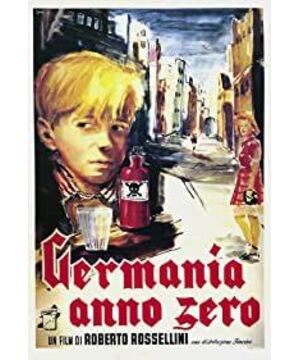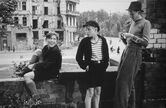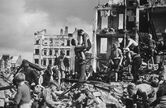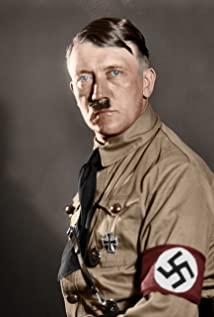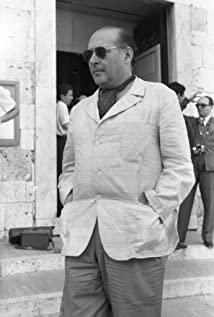The third part of Rossellini's trilogy of realism. The story is set in Germany after the war. The protagonist boy lost his job as a gravedigger because he was reported to be too young. Because the war destroyed countless houses and residences, the boy and his father, brother, and sister were arranged by the government to board with a middle-aged man. My father was seriously ill in bed and unable to work, and my brother was afraid to go out to work because of his sensitive status, so he could only eat at home. In order to maintain the family life, the sister had to go to the Fengyue place to accompany the wine at night, for which she was also despised by the landlord. In this context, young boys have to continue to look for work. He met his former teacher on the street, and the teacher gave him the job of selling Hitler's audiovisual products beside the ruins of the former concentration camp. Obviously this is an allusion to the remnants of the Nazis after the war. The boy made 200 yuan, and the teacher gave him 10 yuan. The boy took the body scale to the street for the landlord to buy it for 300 yuan. As a result, the shrewd passerby used two canned meats. When he went back and was scolded by the landlord, the landlord mentioned that the boy’s family was parasitic in his home and sucked blood, especially their father was in bed all day long, coughing and not working, so he might as well die... For the first time in the film, there is a message that the father should die.
His father's condition became serious and he had to be hospitalized. In the hospital, his father blamed himself for dragging down his family. Due to financial distress, his father decided to leave the hospital. But the family is already poor and has no food. The boy found the teacher for help, but the teacher used the weak to feed the weak. The theory of natural selection made it clear that it might be better if the father who became a burden died. Obviously, this was just a shirk from the teacher sent the boy, but the simple boy listened. In this way, the boy mixed the poison stolen from the hospital into his father's tea and poisoned his father to death. Faced with the father's body, the landlord asked to dispose of it as soon as possible, while the onlookers discussed taking the clothes from the father's body as their own. In the face of poverty, human nature is vulnerable.
At this time, his brother was free after registering his identity at the police station, and he can start looking for a job to make money. But the father is dead, the boy found the teacher in self-doubt and regret, told the teacher of his father-killing behavior and blamed the teacher. The teacher immediately separated from him. With a deep sense of guilt and desperation, the boy jumped to the end of his life on the abandoned, unfinished building.
View more about Germany Year Zero reviews


